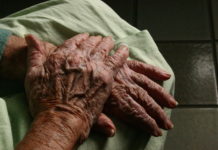 Researchers from the University of Chicago have found that a poor sense of smell in older people can increase their chances of developing dementias like Alzheimer’s disease. Their study has been published in the “Journal of the American Geriatrics Society.”
Researchers from the University of Chicago have found that a poor sense of smell in older people can increase their chances of developing dementias like Alzheimer’s disease. Their study has been published in the “Journal of the American Geriatrics Society.”
While humans don’t have the keen sense of smell that animals like dogs do, they can still identify over a trillion different odors. Olfactory organs in the nose detect the scents, but it’s the brain that actually identifies and sorts smells. The researchers therefore hypothesize that a decline in the ability to recognize scents may be an early symptom of dementia.
In 2005, researchers at the University of Chicago established a longitudinal study called the National Social Life, Health and Aging Project (NSHAP) which would allow them to study the health and social lives of older Americans. Over the next couple of years, they interviewed 3,000 people who were between the ages of 57 and 85.
They also tested the participants’ sense of smell by waving scented “sniffing sticks” under their noses and asking them to identify the smell. The researchers used “sniffing sticks” with such common aromas as peppermint, rose, fish, leather and orange.
People with a normal sense of smell could identify at least four of five odors; 78 percent of the participants fell into this category. Fourteen percent could only identify three scents; five percent could only identify two; two percent could only identify one scent, and one percent of the respondents couldn’t recognize any of the odors.
Later NSHAP interviews conducted in 2010 and 2011, five years after the first set of interviews, showed a marked correlation between a poor sense of smell and a later diagnosis of dementia. Virtually all of the participants who had been unable to identify any smells during the first set of studies had been diagnosed with dementia during the intervening five years. Eighty percent of the respondents who had given only one or two correct answers during the smell test had also developed dementia.
Professor Jayant Pinto, a lead scientist from the University of Chicago, explained that the study indicated a strong correlation between olfaction and brain function. Loss of the sense of smell indicates a deterioration in the workings of the brain. Dr. Pinto recommended using the “sniffing sticks” as a quick and inexpensive way to identify patients who are at risk of developing dementia.





